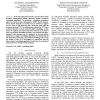Free Online Productivity Tools
i2Speak
i2Symbol
i2OCR
iTex2Img
iWeb2Print
iWeb2Shot
i2Type
iPdf2Split
iPdf2Merge
i2Bopomofo
i2Arabic
i2Style
i2Image
i2PDF
iLatex2Rtf
Sci2ools
VTC
2006
IEEE
2006
IEEE
Cross-Layer Interaction Between TCP and UMTS RRM Scheduling Strategies
— In the third generation wireless system UMTS, Radio Resource Management (RRM) functions should encompass scheduling algorithms. In particular, scheduling mechanisms play a key role in resource allocation for UMTS shared channels. These shared channels are mostly used in UMTS to support services such as web browsing and e-mail that work with the transport protocol TCP. So, performance achieved by TCP users in shared channels is closely related to RRM scheduling. In this letter, we study the cross-layer interaction between TCP and two main sets of RRM scheduling strategies: rate-oriented and delayoriented. Both strategies can be considered as the basic pillars behind more complex scheduling algorithms. We found that the low delay jitter achieved by rate-oriented scheduling is the reason for having a better TCP throughput in comparison with the delay-oriented scheduling algorithm. Results have been obtained with the aid of a real-time UMTS emulator. Keywords- TCP; UMTS; scheduling; RR...
| Added | 12 Jun 2010 |
| Updated | 12 Jun 2010 |
| Type | Conference |
| Year | 2006 |
| Where | VTC |
| Authors | Juan Rendón, Anna Sfairopoulou, Ramon Ferrús, Fernando J. Casadevall |
Comments (0)

